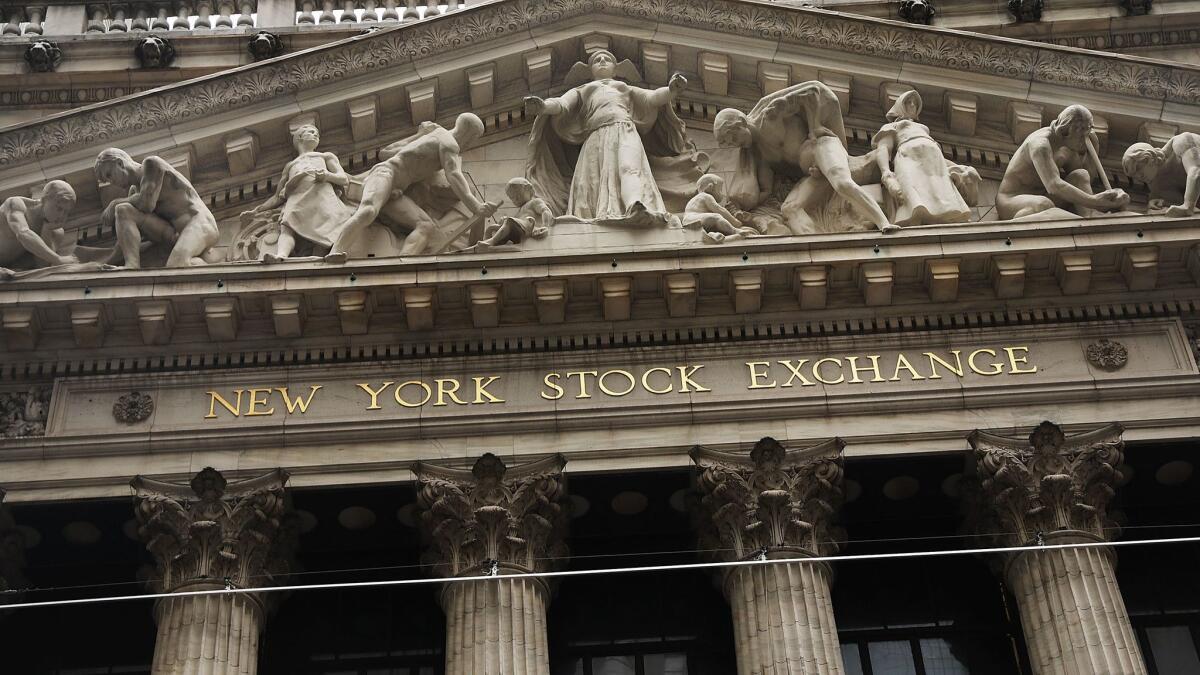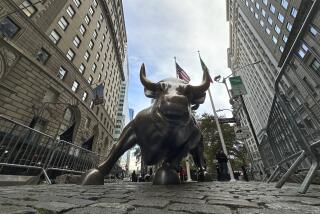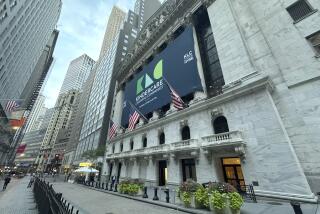Stocks climb as investors hope for glimmer of peace in U.S.-China trade dispute

Stocks climbed again Friday as President Trump and China’s President Xi Jinping prepared to meet and discuss trade, a meeting investors hope will start to resolve the two nations’ trade dispute.
The U.S. market jumped this week after falling to a six-month low the week before. The rally helped the market finish with a modest gain in November, but the Standard & Poor’s 500 index is still 5.8% away from the all-time high it set in late September. Among other issues, that drop reflects investors’ pessimism that the United States and China will resolve their differences without causing damage to the global economy. The two sides have been sparring for months over issues including China’s technology policy.
“The outlook for the global economy in 2019 does depend on some peace in the trade dispute between the U.S. and China,” said David Kelly, chief global strategist for JPMorgan Funds. He said global stocks would probably jump if the two leaders announce the framework of a deal and fall if they don’t. In any case, he thinks the two sides will reach an agreement by early 2019.
“Nobody’s got much to gain from fighting a trade war,” he said, “but we both are threatened with recession.”
Technology and healthcare companies made the largest gains Friday while energy companies slipped as U.S. crude oil fell again, briefly trading under $50 a barrel. The price of crude oil dropped 22% in November, its biggest monthly decline in a decade, hurt by concerns that supplies are too ample as global economic growth slows.
Hotel operator Marriott tumbled after it announced a data breach that could affect 500 million guests.
The S&P 500 index rose 22.41 points, or 0.8%, to 2,760.17. The Dow Jones industrial average rose 199.62 points, or 0.8%, to 25,538.46. The Nasdaq composite rose 57.45 points, or 0.8%, to 7,330.54. The Russell 2000 index of smaller-company stocks advanced 7.88 points, or 0.5%, to 1,533.27.
The United States has announced tariffs on $250 billion worth of imports from China this year, with the tax rate on many products set to rise Jan. 1, while China put new taxes on $110 billion worth of U.S. goods. Investors are concerned that the lingering dispute will keep businesses from spending money. That might not change even if the nations announce a cease-fire on new tariffs or the outlines of a deal this weekend.
“There’s still a long way to resolve all of the issues,” said Kate Warne, an investment strategist with Edward Jones. “I suspect we’ll continue to see more of the back and forth that we’ve seen this week, prompting further market volatility as well as greater uncertainty.”
Among technology companies, Intel advanced 3.4% to $49.31 and Nvidia climbed 3.9% to $163.43.
Microsoft rose 0.6% to $110.89 and Apple fell 0.5% to $178.58, which meant Microsoft surpassed Apple as the world’s most valuable publicly traded company. Microsoft’s current market value is $851.2 billion to Apple’s $847.4 billion. Amazon isn’t far behind, at $826.4 billion.
Microsoft was the world’s most valuable publicly traded company during the dot-com boom, but hadn’t held the title since 2000. Apple became No. 1 earlier this decade, when it surpassed Exxon Mobil.
Healthcare companies climbed. Biotech drugmaker AbbVie rose 4.8% to $94.27 after it said Pfizer agreed to wait until November 2023 before it starts selling a generic version of AbbVie’s inflammatory disease drug Humira in the United States. The agreement is part of a licensing deal between the companies. Humira is the biggest-selling drug in the world by revenue, and it’s responsible for about two-thirds of AbbVie’s total sales.
Other biotech drugmakers also traded higher. Gilead Sciences rallied 3.2% to $71.94. Amgen rose 2.9% to $208.25.
Bond prices rose further. The yield on the 10-year Treasury note fell to 2.99%, its lowest since mid-September, from 3.03%.
Marriott slid 5.6% to $115.03 after disclosing the Starwood data breach, which it said began in 2014 and ended in September 2018. Marriott bought Starwood in 2016. The company said the credit card information of some guests may have been taken, along with other personal details. The affected brands include W Hotels, St. Regis, Sheraton, Westin, Element, Aloft, the Luxury Collection, Le Meridien and Four Points. New York’s attorney general said she was opening an investigation into the breach.
Benchmark U.S. crude ended down 1% at $50.93 a barrel in New York. Brent crude fell 1.3% to $58.71 a barrel in London.
Oil prices have been falling since early October as supplies have built up, partly because the United States agreed to hold off on sanctions for countries that import oil from Iran. Investors are also worried that a slowdown in global economic growth will reduce demand for fuels.
The dollar rose to 113.61 yen from 113.43 yen. The euro fell to $1.1309 from $1.1389.
Gold fell 0.4% to $1,226 an ounce. Silver fell 1.3% to $14.22 an ounce. Copper held steady at $2.79 a pound.
Wholesale gasoline fell 0.9% to $1.44 a gallon. Heating oil was little changed at $1.85 a gallon. Natural gas fell 0.7% to $4.61 per 1,000 cubic feet.
UPDATES:
2:50 p.m.: This article was updated with closing prices, context and analyst comment.
This article was originally published at 9:20 a.m.
More to Read
Inside the business of entertainment
The Wide Shot brings you news, analysis and insights on everything from streaming wars to production — and what it all means for the future.
You may occasionally receive promotional content from the Los Angeles Times.










